

Isadora Duncan. Annabella (actress) Annabella (14 July 1907 – 18 September 1996)[2] was a French cinema actress who appeared in 46 films between 1927 and 1952, including some Hollywood films during the late 1930s and 1940s.
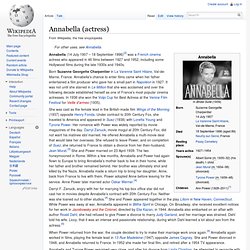
When Power returned from the war, the couple decided to try to make their marriage work once again.[4] Annabella again worked in films, playing the female lead in 13 Rue Madeleine (1947) opposite James Cagney. She and Power divorced in 1948, and Annabella returned to France. In 1952 she made her final film, and retired after a 1954 TV appearance. Annabella and Tyrone Power remained very close, and after his divorce from Linda Christian, he attempted to reconcile with her, confessing that in giving her up, he had made a terrible mistake. However, Annabella refused. La Goulue. Louise Weber (13 July 1866, Alsace-Lorraine – 30 January 1929) was a French can-can dancer who performed under the stage name of La Goulue ("the glutton").[1] She also was referred to as the Queen of Montmartre.
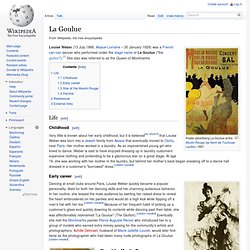
Emma Livry. Emma Livry (born as Jeanne Emma Emarot or Emma Marie Emarot; 24 September 1842 – 26 July 1863) was one of the last ballerinas of the Romantic ballet era and a protégée of Marie Taglioni.
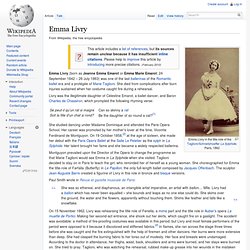
She died from complications after burn injuries sustained when her costume caught fire during a rehearsal. Livry was the illegitimate daughter of Célestine Emarot, a ballet dancer, and Baron Charles de Chassiron, which prompted the following rhyming verse: She studied dancing under Madame Dominique and attended the Paris Opera School. Her career was promoted by her mother's lover at the time, Vicomte Ferdinand de Montguyon. On 19 October 1858,[2] at the age of sixteen, she made her debut with the Paris Opera Ballet at the Salle Le Peletier as the sylph in La Sylphide. Paul Smith wrote in Revue et gazette musicale de Paris: On 15 November 1862, Livry was rehearsing the title role of Fenella, a mime part and the title role in Auber's opera La muette de Portici. References[edit] Jump up ^ Guest, Ivor. M. Fanny Cerrito. Francesca "Fanny" Cerrito (11 May 1817 – 6 May 1909) was an Italian ballet dancer and choreographer.
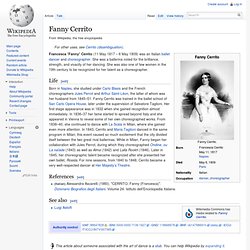
She was a ballerina noted for the brilliance, strength, and vivacity of her dancing. She was also one of few women in the 19th century to be recognized for her talent as a choreographer. Marie Taglioni. Mary Philbin. Biography[edit] Born in Chicago, Illinois into a middle-class Irish American Catholic family, she began her acting career after winning a beauty contest sponsored by Universal Pictures.
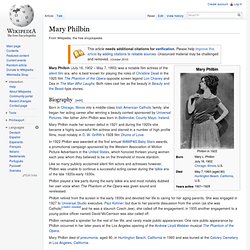
Her father John Philbin was born in Ballinrobe, County Mayo, Ireland. Mary Philbin made her screen debut in 1921 and during the 1920s she became a highly successful film actress and starred in a number of high profile films, most notably in D. W. Griffith's 1928 film Drums of Love. In 1922 Philbin was awarded at the first annual WAMPAS Baby Stars awards, a promotional campaign sponsored by the Western Association of Motion Picture Advertisers in the United States, which honored thirteen young women each year whom they believed to be on the threshold of movie stardom. Like so many publicly acclaimed silent film actors and actresses however, Philbin was unable to continue a successful acting career during the talkie era of the late 1920s-early 1930s. Madame de Pompadour. Early life[edit] Jeanne Antoinette Poisson, otherwise known as Reinette ("little queen") to her friends, was born on 29 December 1721 in Paris to François Poisson (1684–1754) and his wife Madeleine de La Motte (1699–1745).
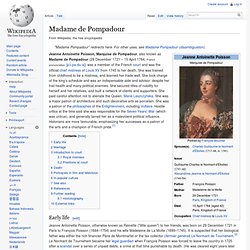
It is suspected that her biological father was either the rich financier Pâris de Montmartel or the tax collector (fermier général) Le Normant de Tournehem.[2] Le Normant de Tournehem became her legal guardian when François Poisson was forced to leave the country in 1725 after a scandal over a series of unpaid debts, a crime at that time punishable by death.
(He was cleared eight years later and allowed to return to France.) Her younger brother was Abel-François Poisson de Vandières, who later became the Marquis de Marigny. Oscar Wilde. 19th-century Irish poet, playwright and aesthete Oscar Fingal O'Flahertie Wills Wilde (16 October 1854 – 30 November 1900) was an Irish poet and playwright.
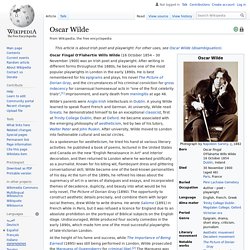
After writing in different forms throughout the 1880s, he became one of the most popular playwrights in London in the early 1890s. He is best remembered for his epigrams and plays, his novel The Picture of Dorian Gray, and the circumstances of his criminal conviction for gross indecency for consensual homosexual acts in "one of the first celebrity trials",[1] imprisonment, and early death from meningitis at age 46.
Wilde's parents were Anglo-Irish intellectuals in Dublin. A young Wilde learned to speak fluent French and German. Early life[edit] The Wilde family home on Merrion Square Oscar Wilde was born at 21 Westland Row, Dublin (now home of the Oscar Wilde Centre, Trinity College), the second of three children born to an Anglo-Irish couple: Jane, née Elgee and Sir William Wilde. Zsa Zsa Gabor.